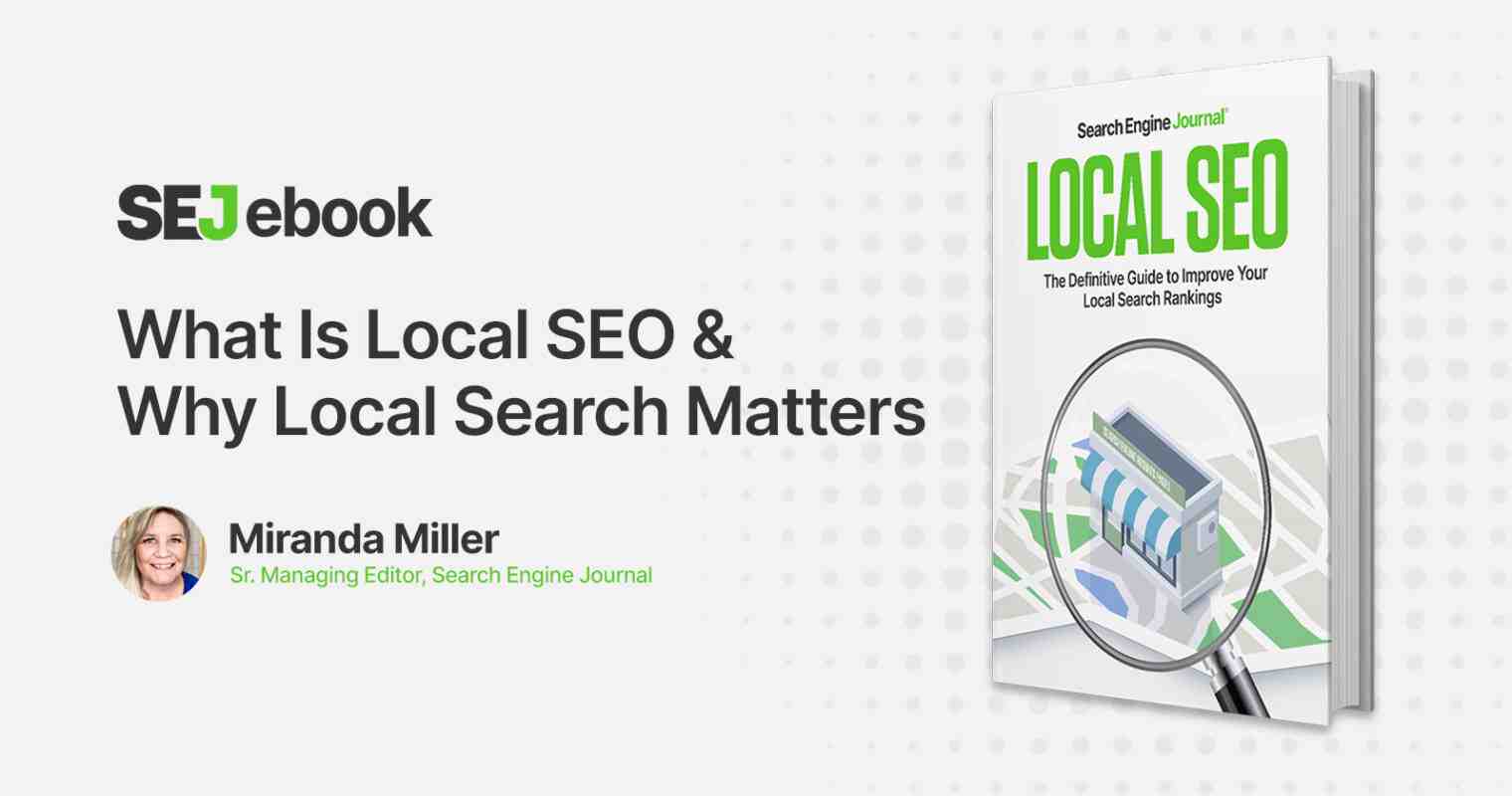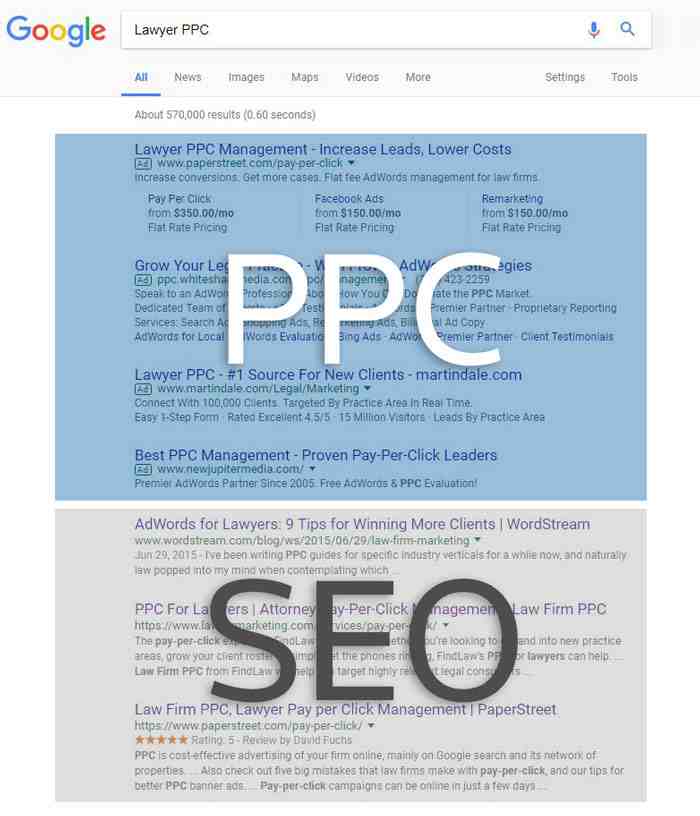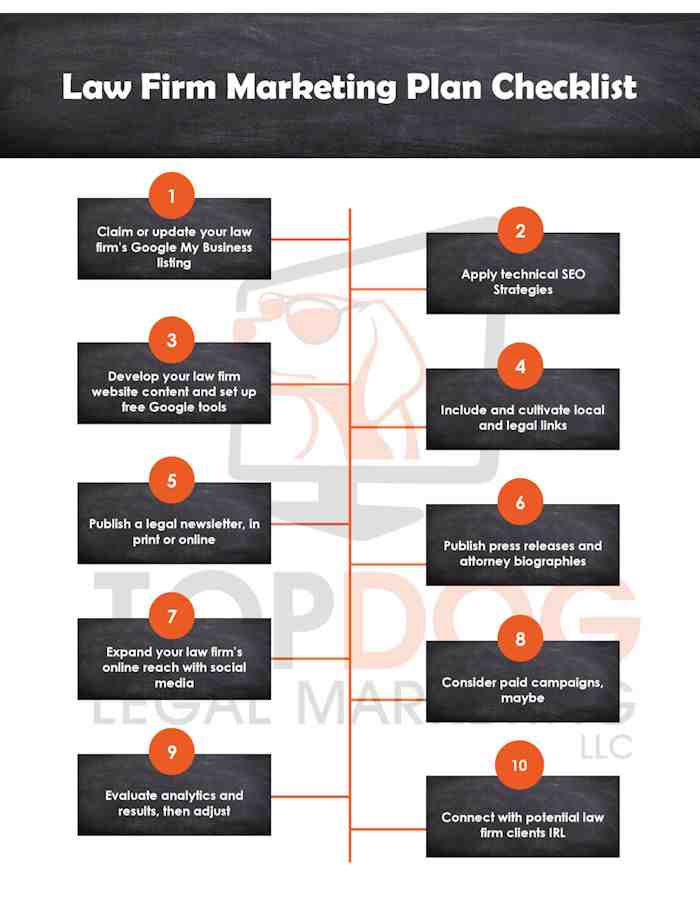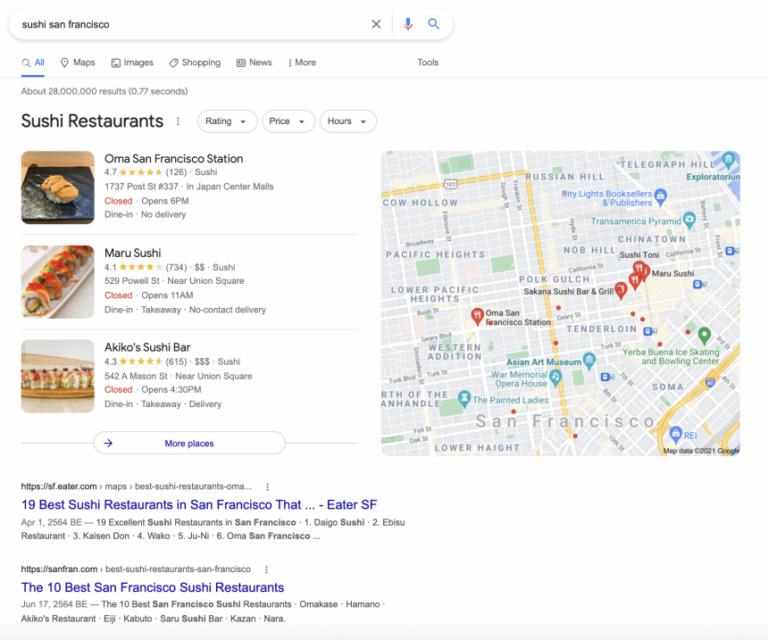What is Local SEO and Why It Matters for Law Offices
Do you know the difference between regular organic SEO and local SEO? Do you know why the difference even matters? Here, we’ll break down the basics of local SEO for law firms and how it impacts your search engine strategy.
Simply put, local SEO is where marketers focus to improve search engine rankings and visibility in local search results such as Google’s Map Pack or Local Pack. Local search is important for any SEO strategy targeting people in a specific region, city or area – and this tends to be especially true for law firms.
Organic SEO is how marketers improve the ranking of web pages in organic search, and how your website ranks in those organic results can also impact your Local Pack ranking. So, organic SEO and local SEO are interconnected in some ways – but not the same thing. They are both part of an integrated strategy for a business aiming for a strong local presence as well as great online visibility overall. Each element requires its own strategy and tactics.
What is Local SEO for Law Firms?

As we mentioned, local SEO is the practice of search engine optimization for local search results. For example, on Google, this means helping your business listing in the Local Pack/Map Pack rank higher and show up more often when people search. Ideally, your business results will show up more often in response to more relevant queries.
Remember that Google’s mission is to provide searchers with the answers they seek – hence the increased importance of searcher intent. When their algorithms can detect that a person’s “intent” is local (that they are looking for something in the area around them), map pack results will appear more prominently at the top of search results pages. research. These results may be featured alongside organic results from other businesses or services in the area. Google has also become very good at identifying immediate local needs and providing results for this type of search. They know that making the right information available in local search results, like the business name, address, and phone number, is probably more useful than just a link.
While a great user experience is important for overall organic SEO, Google also provides a set of guidelines for local SEO. It is essential to follow these guidelines to maximize visibility in the map pack and to prevent your ad from being suspended for any reason.
Why Does Local Search Matter?
To understand the importance of local search, take a look at these statistics from BrightLocal’s in-depth local consumer survey.
Basically, you should assume that your community members are using local searches to find what they need, including legal advice. For the majority of people, online search engines (especially Google) are the first place they start looking for services. The more you can appear in these searches, the better your chances of being found by potential customers.
Additionally, when it comes to lawyers and law firms, Google will display a “call” button directly in the local search result on mobile phones. When a potential customer does a quick search on their phone for your type of business, they’ll see results targeted to their location, along with a dominating call-to-action in the form of the “Call Us” button. This is particularly important for areas of law where people want to set up consultations quickly – for example immediately after a car accident or a criminal arrest. When done correctly, optimized local search can help your business be in front of people exactly when they are looking for a lawyer.
How to Improve Your Local Search Ranking

According to experts, there are three important categories when it comes to local search. They are:
To improve these categories, pay attention to the following ranking factors:
In addition to specifically optimizing for these local ranking factors, it is essential to double-check your NAP (name, address, phone number) information on all linking sites, listings, etc. in great shape, posting the highest quality content possible and trying to earn more links from a variety of websites to stand out more in the eyes of Google. For more information on implementing SEO best practices, download this free SEO eBook for law firms.
Also, remember that many local queries are based on voice search. People can say things like “Find a lawyer near me” on their mobile device. Try keyword variations that include questions as well as such instructions. You can use a topic search tool like SEMrush to see the questions people are searching for as well as the volume.
Local search requires a dedicated strategy, but it doesn’t need to be overly complicated. Your main goal is to increase your visibility in Google’s local pack and have your business information immediately accessible when people search for lawyers in your area. Focus on improving the local search ranking factors we mentioned above.
If you want to dive deeper into SEO, start with our free SEO audit. This tool helps legal marketers find and resolve on-site issues while improving SEO results.
How much do law firms spend on SEO?

How much should SEO cost for lawyers and law firms? Generally, it will be between $2,000 and $10,000 per month in most cases. Smaller markets with less competitive practice areas may pay less than $2,000 for results, while larger cities and competitive law areas may cost well north of $10,000 per month.
Do law firms need SEO? The short answer is yes – law firms need SEO to grow organically and reach more clients online. But law firm SEO has many benefits that go beyond traffic and leads.
How much do law firms spend on Google ads?
Search Ad budgets for lawyers vary by area of law. On average, businesses can expect to start with $2,000 per month. More competitive areas such as personal injury should start with $3,000 per month. Wills and estates can start around $500 per month.
How much should a law firm spend on advertising?
How much does an average law firm spend on marketing? It is recommended to allocate between 2% and 18% of gross revenue to marketing. In 2018, the Legal Marketing Association reported that law firms only allocated an average of 6.7% of their revenue to marketing initiatives.
How much do companies spend on Google Ads per month?
The average small business using Google Ads spends between $5,000 and $12,000 per month on their Google paid search campaigns.
Do Google Ads work for law firms?
Google Ads can work well for most businesses, including law firms. But it’s difficult for beginners and can get very expensive, very quickly. Although you only pay for the clicks, in some cases those clicks can cost upwards of $50. “Avocado” is one of the most expensive keywords.
How much does the average company spend on Google Ads?
Giant retailers can spend up to $50 million a year on paid search in AdWords. The average Google AdWords cost for a small business is between $9,000 and $10,000 per month for their Google paid search campaigns. It’s $100,000 to $120,000 a year.
What percentage of revenue should a law firm spend on marketing?
What is the average law firm marketing spend? An average expense of about two percent of gross revenue is common in law firms, but varies based on individual needs and factors. Many law firm management consultants recommend spending between 2-5% for most firms.
How much do law firms spend on advertising?
How much does an average law firm spend on marketing? It is recommended to allocate between 2% and 18% of gross revenue to marketing. In 2018, the Legal Marketing Association reported that law firms only allocated an average of 6.7% of their revenue to marketing initiatives.
How much do law firms spend on PPC?
Law firms “can easily spend $50,000 to $100,000 a month on PPC,” according to legal marketer Robert Ramirez.
How much does the average company spend on marketing?
A 2016 survey of 168 CMOs found that marketing budgets can represent up to 40% of a company’s budget, with a median of 10% of the overall budget and an average of 12%. When expressed as a percentage of total revenue, the mean was 8% and the median 5%.
How much should a firm spend on marketing?
Simply put, your marketing budget should be a percentage of your revenue. A general rule of thumb is that B2B companies should spend between 2-5% of their revenue on marketing. For B2C companies, the proportion is often higher, between 5 and 10%.
Does SEO work for lawyers?
SEO for lawyers remains one of the most effective ways for law firms to attract quality clients. Consider these legal statistics: 96% of people seeking legal advice use a search engine.
Why is SEO important for lawyers?
It is a process that must be implemented for you to gain significant visibility online and the stronger your SEO efforts, the higher your business and website will rank. This is especially important for law firms, as top page rankings often result in more credible and trustworthy attorneys.
Does SEO work for law firms?
With the help of SEO, law firms achieve better organic (unpaid) search ranking positions and are more likely to receive more high-quality cases due to their increased visibility in search engines like Google. , Bing, Youtube or smaller engines like Duck Duck Go .
Why is networking important for lawyers?

Having access to information about jobs, developments within your firm, events in the legal market, clients with cases they can refer to you and your firm, and more is essential to your success as a lawyer. Moreover, being known to sources of information relevant to your career is even more important.
Why is communication important with the attorney? A lawyer is responsible for giving candid advice to clients, even when it involves bad news. Lawyer communication skills will enable a lawyer to convey this news in a way that keeps a client’s expectations grounded, but also maintains their morale and trust in the lawyer.
Is networking important for lawyers?
His network of exceptional professionals in their field and – above all – who trust each other will not only become one of the greatest sources of traditional references, but also a reflection of his position as a lawyer.
How do you network a legal profession?
Legal Networking: How to Network in the Legal World
- Create and use business cards.
- Embrace the “Always On” mindset.
- Join bar associations for legal networking.
- Attend official legal networking events.
- Keep the conversations going.
- Work pro bono to stimulate legal networking.
- Volunteer in your community.
How do lawyers network?
The If/When/How RJ Lawyers Network is a powerful national group of pro bono legal professionals who are mobilizing against attacks on reproductive freedom, growing with each other as advocates for reproductive justice, and integrating values of reproductive justice in their daily work.
Is networking important in law school?
Legal career experts say networking is key when pursuing summer internships — which often lead to full-time job offers — or long-term employment.
Why is legal networking important?
Business relationships will thrive with diligent care and nurturing. If left unattended, they too will wither away. Lawyers who recognize the value of relationships will take the time to manage and nurture those relationships and ensure a successful practice. Businesses can never stop managing their network.
What is legal networking?
A law firm network (law firm association or legal network) is a membership organization made up of independent law firms. These networks are a type of professional services network similar to the networks found in the accountancy profession.
Why is it important to networking?
Networking will help you develop and improve your skills and stay on top of the latest trends in your industry and job market. Networking also helps you advance your career and gives you access to more job opportunities.
How do you network the legal industry?
Networking is essential in the legal industry.
- Trust yourself. …
- Define your goal. …
- Own your story. …
- Practice your elevator pitch. …
- Icebreaker ahead. …
- Do advanced research on the people who will be attending the event. …
- Bring more people into conversations. …
- Be an active listener.
How do lawyers network?
The If/When/How RJ Lawyers Network is a powerful national group of pro bono legal professionals who are mobilizing against attacks on reproductive freedom, growing with each other as advocates for reproductive justice, and integrating values of reproductive justice in their daily work.
How do you network a legal profession?
Legal Networking: How to Network in the Legal World
- Create and use business cards.
- Embrace the “Always On” mindset.
- Join bar associations for legal networking.
- Attend official legal networking events.
- Keep the conversations going.
- Work pro bono to stimulate legal networking.
- Volunteer in your community.
How do I network my attorney?
Look for volunteer opportunities in the area of law that most interests you. Attend presentations, conferences and symposia. The more people you know, the more likely you are to hear about great opportunities. Networking is especially important for side counsel.
What is legal networking?
A law firm network (law firm association or legal network) is a membership organization made up of independent law firms. These networks are a type of professional services network similar to the networks found in the accountancy profession.
How do I network my law students?
Tip 1: Find networking opportunities
- Elders. All law schools do their best to keep in touch with alumni. …
- Status bar events. It’s never too early to get involved with your state bar. …
- Networking events. Your law school should have a list of networking events. …
- Professors.
Is networking important in law school? Legal career experts say networking is key when pursuing summer internships — which often lead to full-time job offers — or long-term employment.
How do I network before law school?
A great way to start networking early in law school is to join student groups that relate to areas of law that interest you. First, you will meet other students who have the same interest as you, many of whom will be upper class members who may have tips for getting to know practitioners in this area of law.
What is local SEO?
Local SEO is a search engine optimization (SEO) strategy that helps your business be more visible in local search results on Google. Any business with a physical location or serving a geographic area can benefit from local SEO.
Why do I need local SEO? Local SEO helps your business stand out – even if you don’t have a website – and helps drive more traffic to your premises through online leads. Since these leads come from people who are specifically looking for products or services offered by your business, they are also likely to give you a high conversion rate.
What is the difference between SEO and local SEO?
Here is the difference. While traditional SEO focuses on improving your site’s national or global visibility, local SEO allows you to capture local search territory to connect with searchers in your area. SEO and local SEO use many of the same strategies.
Is local SEO easier?
Local SEO is almost always cheaper than national SEO because there is less competition for local keywords and you will be targeting a smaller audience than if you used a national keyword. In many ways, local SEO is easier to conceptualize, implement, and manage than national SEO.
What is the difference between local and organic SEO?
Based on these definitions, we can establish the basic difference between local SEO and organic SEO: local SEO is about optimizing placements while organic SEO is about optimizing content. They both have to do with optimizing your website and online presence for search engines.
